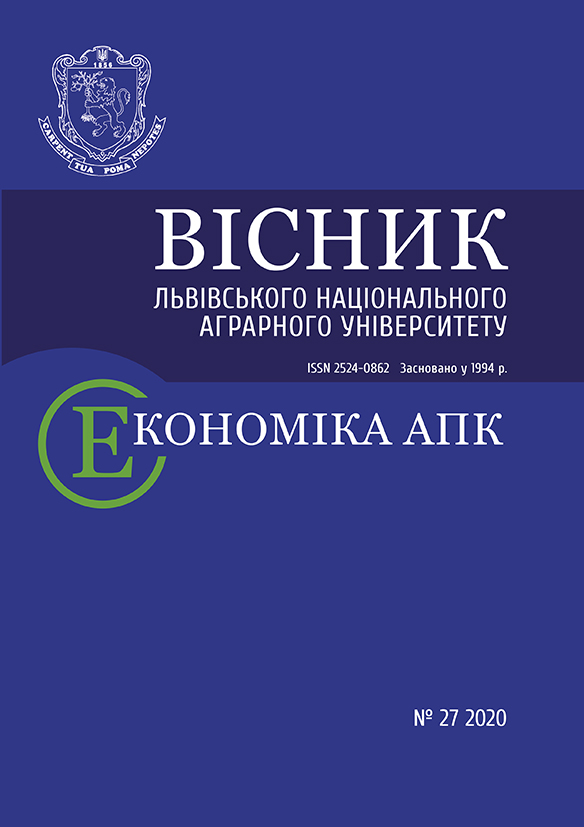Visnyk LNAU: Architecture and Farm Building 2021 №22: 144-148
SUBSTANTIATION OF THE NEED TO INCREASE THE ADAPTIVE POTENTIAL OF THE RECLAIMED LANDS OF HYDRO-AMELIORATIVE SYSTEMS IN VARIABLE CLIMATIC CONDITIONS
А. Rokochynskyi, Doctor of Technical Sciences
ORCID ID: 0000-0002-5248-6394
V. Turcheniuk, Doctor of Technical Sciences
ORCID ID: 0000-0002-1938-0344
P. Volk, Candidate of Technical Sciences
ORCID ID: 0000-0001-5736-8314
R. Koptiuk, Candidate of Technical Sciences
ORCID ID: 0000-0002-7086-3608
N. Prykhodko, Candidate of Technical Sciences
ORCID ID: 0000-0003-1424-2628
National University of Water and Environmental Engineering
https://doi.org/10.31734/architecture2021.22.144
Annotation
The article presents substantiation of the need and considers the prerequisites for increasing the adaptive potential of the reclaimed lands of hydro-ameliorative systems. This is an extremely important task of ensuring and maintaining food and water security in variable climatic conditions which poses the need to find ways to create sustainable agricultural production systems, in particular on reclaimed lands, and increasing the efficiency of hydro-ameliorative systems under rational use of water and energy resources.
Increasing the adaptation potential of the reclaimed lands of hydro-ameliorative systems requires identification of the main priority areas of their effective use and scenarios for the conditions of development and productivity of crops, water and soil regimes, based on the organization of ecological and reclamation monitoring, improvement and modernization of hydro-ameliorative systems, methods of regulating the water-air regime and traditional farming systems, taking into account the full range of soil and hydrogeological conditions, changes in climatic and anthropogenic factors.
During the last years, as a result of climate change and increasing of its aridity there have been significant changes in the natural moisture supply of Ukraine. However, with regard to the specific assessment of climate and the impact of its changes on the efficiency of use of the reclaimed lands of hydro-ameliorative systems and recommendations for production concerning a set of adaptive measures, in particular, improvement and modernization of the hydro-ameliorative systems’ design, technologies and means of their implementation in changing climatic conditions to ensure food and water security - such developments almost do not existent today.
Increasing the adaptive potential of reclaimed lands demands taking into account the relevant meteorological information in the water reclamation projects and substantiation of the level of economic and environmental efficiency of their implementation. It is established that increasing the adaptive potential of reclaimed lands requires development of a set of organizational and economic, operational and agricultural, construction and design adaptive measures with consideration of the peculiarities of weather-climatic conditions and natural-reclamation conditions of a particular region in compliance with the modern economic and environmental requirements to the functioning of hydro-ameliorative systems.
Key words
substantiation of the need, adaptive potential, reclaimed lands, hydro-ameliorative systems, variable climatic conditions
Link
- Blanc E., Schlenker W. The use of panel models in assessments of climate impacts on agriculture. Review of Environmental Economics and Policy. 2017. Vol. 11, No. 2. P. 258–279.
- Brown M. E., Antle J. M., Backlund P. et al. Climate Change, Global Food Security, and the U.S. Food System. 2015. 146 p. doi: 10.7930/J0862DC7.
- Dong Z., Pan Z., Wang S. Effective crop structure adjustment under climate change. Ecological Indicators. 2016. Vol. 69. P. 571–577.
- Global Food Security Index: Rankings and trends. URL: https://foodsecurityindex.eiu.com/Index (last accessed: 17.03.2021).
- Gohar A. A., Cashman A. Methodology to assess the impact of climate variability and change on water resources, food security and economic welfare. Agricultural Systems. 2016. Vol. 147. Р. 51–64.
- Irrigation and drainage strategy in Ukraine until 2030. URL: https://zakon.rada.gov.ua/laws/show/688-2019-%D1%80#Text (Accessed: March 24, 2021).
- Massey Eric E. The experience of the European Union in adapting to climate change and its application in Ukraine. Office of the OSCE Economic and Environmental Coordinator, 2012. 40 p.
- Mostafa Rezaei Zaman, Saeed Morid, Majid Delavar. Evaluating climate adaptation strategies on agricultural production in the Siminehrud catchment and inflow into Lake Urmia, Iran using SWAT within an OECD framework. Agricultural System. 2016. Vol. 147. P. 98–110. doi: 10.1016/j.agsy.2016.06.001.
- Rokochynskyi A. M. The scientific and practical aspects optimization of water regulation drained: monograph. Rivne: NUWEE, 2010. 351 p.
- Stepanenko S. M., Polovyi A. M., Loboda N. S. Climate changes and their impact on the economy of Ukraine: monograph. Odessa: ТЕС, 2015. 520 p.
- Sustainable Development Goals: Guidelines. URL: http://www.un.org/sustainabledevelopment/news/communications-material/ (Аccessed: March, 10, 2021).



